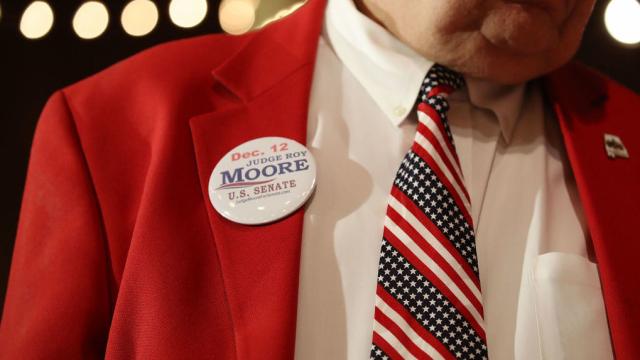With all the talk about Russians using social media to amplify divisive political messaging and influence voter turnout, little attention has been paid to the inevitable use of those tactics by Americans. According to the New York Times, it’s already happening: A group of researchers actually mirrored Russian methods in the 2017 Alabama Senate race to oppose Republican candidate Roy Moore.
Based on tech companies’ own admissions, intelligence service analysis, and independent researchers evaluations, we know that Russian operatives used bots, fake accounts, and group pages to fuel an online campaign aiming to harm Hillary Clinton and boost Donald Trump in the 2016 election. By all credible accounts, that activity is still happening. And while we’ll never truly know if that activity helped the Trump campaign, there’s little reason to believe it caused harm, and Trump did win. So it only makes sense that American political operatives would take the bot game for a spin.
The New York Times obtained an internal report by a group of Democratic tech experts that outlines an experiment they ran during Roy Moore’s controversial run for Alabama Senate late last year. The Times writes:
The project’s operators created a Facebook page on which they posed as conservative Alabamians, using it to try to divide Republicans and even to endorse a write-in candidate to draw votes from Mr. Moore. It involved a scheme to link the Moore campaign to thousands of Russian accounts that suddenly began following the Republican candidate on Twitter, a development that drew national media attention.
“We orchestrated an elaborate ‘false flag’ operation that planted the idea that the Moore campaign was amplified on social media by a Russian botnet,” the report says.
Among the participants in the project was Jonathon Morgan, CEO of New Knowledge, a cybersecurity firm that was commissioned to write one of two reports on Russia’s 2016 activities for the Senate Intel Committee. Those reports, released to the public earlier this week, found that Russian troll farm operations were more widespread than we knew and criticised tech companies’ cooperation with the investigation.
Morgan told the Times that he did not recall the use of a Russian botnet in what he characterised as a “small experiment.” The internal report described the use of $US100,000 ($141,075) to run an online campaign designed to “enrage and energize Democrats” and “depress” Republican turnout in the Alabama race without actually having a meaningful impact. The group’s funding passed through a Democratic think tank funded by Reid Hoffman, the founder of LinkedIn and an early Facebook investor. A spokesperson for Hoffman told the Times, “our purpose in investing in politics and civic engagement is to strengthen American democracy” and claimed they weren’t aware of funding any deceptive projects.
In total, $US51 ($72) million was spent on the controversial race that Democratic candidate Doug Jones ultimately won by 21,924 votes. And to be absolutely clear, Moore was credibly accused of preying on teenage girls in reporting that won the Washington Post a Pulitzer Prize.
According to the Times, the group of researchers entered into an agreement with a Republican write-in candidate named Mac Watson to boost his campaign opposing Moore. Watson said that he reached out to numerous local conservative Facebook groups for support, and the phony experimental page was the only one that responded positively. He downplayed the notion that it was of very much help but said that he did notice his Twitter followers suddenly jumped from 100 to 10,000 and that page’s endorsement led to interviews with The Montgomery Advertiser and The Washington Post. In the end, Watson only won “a few hundred” write-in votes, and he thought it was odd that the page simply vanished immediately after the election.
It’s unclear if the group paid for a Russian botnet to swarm Roy Moore’s Twitter account with followers, but the internal report took credit for “radicalizing Democrats with a Russian bot scandal” as stories spread in the media that Moore was getting a Kremlin boost along with his Donald Trump endorsement.
On Wednesday, Morgan posted a statement on the Times report to his Twitter account:
Without having seen the internal report ourselves, we can only go by the Times’s characterization of its contents. But this single campaign isn’t the primary point. The lesson is that American politicians will inevitably employ these types of shadow tactics to make some issues and movements seem bigger than they really are through the funhouse of social media. Dan Bayens, a Kentucky-based Republican consultant, told the Times: “You’ve got Russia, which showed folks how to do it, you’ve got consultants willing to engage in this type of behaviour and political leaders who apparently find it futile to stop it.”
Lawmakers and the public are outraged by Russian election interference because it’s coming from a foreign power and is illegal. What’s unsettling is that doing this to ourselves is technically legal if all campaign finance laws are followed. It is, however, against Facebook’s terms of service for users to engage in “inauthentic behaviour” like impersonating Alabamians who are crazy excited about a write-in candidate. We asked Facebook if it intends to take any punitive action against the people involved in the report but did not receive an immediate reply.
One more time for everyone in the back: Roy Moore was credibly social media dirty tricks. But this report will convince many that the election was stolen from Moore. It’s a cautionary tale that these methods are available to any unsophisticated user who wants to employ them. But if those tactics are used, there’s no way to say for sure if they produced results at the ballot box. And a legitimate win will be tainted in the public eye the moment the social media ratfuckery is exposed.
